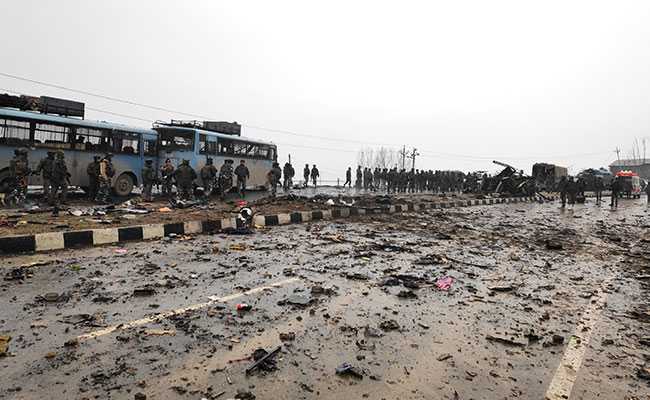Today, the nation is paying homage to the 40 CRPF soldiers who gave the supreme sacrifice during a dastardly Fidayeen attack on a CRPF convoy in Jammu & Kashmir’s Pulwama.
The terror attack orchestrated by Pakistan-sponsored Jaish e Mohammed had sent shockwaves across the country and there was one common sentiment- avenging the sacrifice of the 40 CRPF soldiers.
The Pulwama terror attack is bound to be remembered as one of the most saddening events in the glorious history of Indian Armed forces. The terror attack also has a wider geopolitical implication. In fact, it has changed the sub-continent forever.
Amidst calls for avenging the sacrifice of the soldiers, India had carried out non-military, pre-emptive strikes deep into Pakistani territory on February 26- exactly 12 days after the dastardly terror attack on a CRPF convoy in Pulwama.
The IAF bombed the Jaish-e-Mohammed Madrasas (read ‘terror training camps’) based in Balakot of Pakistan’s Khyber Pakhtunkhwa province.
The Indian Air Force had reportedly dropped around 1000 kg bombs on the Jaish-e-Mohammed camps in the wee hours of February 26.
IAF’s Mirage 2000 fighter jets, which carried out the Balakot airstrike, had dropped Spice 2000 precision bombs with “penetrative warheads”. These bombs pierced the roofs of the intended targets and exploded inside the buildings.
Therefore, internal damage was caused without any collateral damage to the structures that were targeted. Later, there were reports that more than 300 mobile phones were active in the area where the strikes took place. Moreover, it was very much clear from the testimony of a terrorist student that on February 26 Jaish’s camps were bombed and many terrorists were killed.
Code-named ‘Operation Bandar’, the airstrikes turned out to be a phenomenal succeess. Five Spice-2000 bombs were dropped inside the JeM facility, out of which four penetrated the rooftops of the targeted buildings.
The Pulwama terror strikes led to a sharp change in India’s military doctrine. As far as New Delhi’s Pakistan policy is concerned, it is clear that our military posture has changed to a point of no return.
Even before the Balakot airstrikes, India had inflicted significant costs upon Pakistan for fomenting terorrism against India. The 2016 Surgical Strikes carried out by the Indian Army in Pakistan occupied Kashmir (PoK) following the Uri terror attack being one of the biggest examples.
But Balakot airstrikes were different, more significant than the 2016 strikes for primarily two reasons:
- It was one step further in the escaltory ladder insofar invading Pakistan’s airspace is concerned. There is a lot of difference in ground-level strikes and airstrikes. Balakot airstrikes was a more severe and befitting measure than the 2016 strikes.
- In 2016, India has only struck in the Pakistan occupied Kashmir (PoK). But Balakot airstrikes were carried out in what can be described as legitimate Pakistani territory.
While the 2016 strikes were significant in their own right as it gave a loud and clear message that the sanctity of LoC would not be recognised if Pakistan orchestrated a terror attack in India. Balakot airstrikes went a step further. India made it clear that it reserves the right to transgress the International Border and not just the Line of Control (LoC).
Pakistan now doesn’t have the option of pulling back its terrorists from the LoC into the regular Pakistani territory after a misadventure.
The IAF had struck in Khyber Pakhtunkhwa- the heart of Pakistan’s terror industry. The message was loud and clear- terrorists are not safe anywhere, be it Pakistan occupied Kashmir or regular Pakistani territory. If there is a misadventure, India will strike and strike hard.
It can be argued that India has gone the Israel way. Whether it were the Operation Wrath of God, Bekka Valley shootout or assassination of PLO operative in Dubai, Israel has never shied away from going deep inside the enemy’s territory and showing them their place. Israel has given back to its enemy in equal, or in fact, excessive measure. After Pulwama terror attack, India seems to have made it a point to hit back in disproportionate, excessive measure if Pakistan indulges in any misadventure in the Indian territory.
The past one year has seen several military developments in India- the coming up of the Integrated Battle Groups (IBGs) and the creation of the Combined Chief of Defence Staff (CDS) being the most important ones that have placed India in a position to hit back with even greater vigour.
February 14 is a day that India will remember as the day when 40 of its bravehearts gave the supreme sacrifice. Pakistan, on the other hand, will remember it with regret for it was due to its nefarious actions on this day that it invited the wrath of India’s military might.
